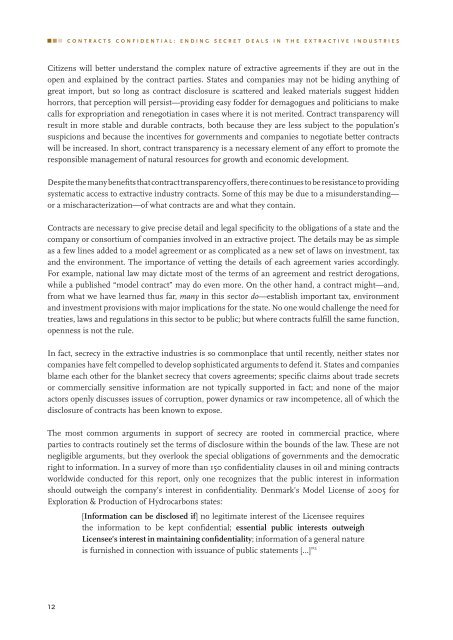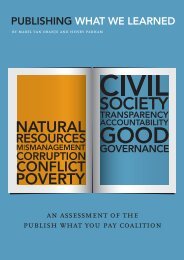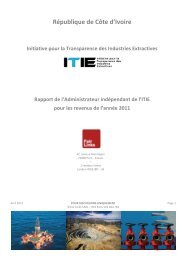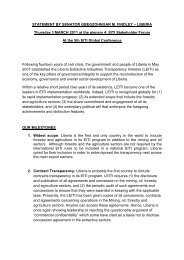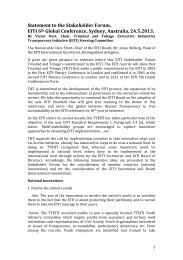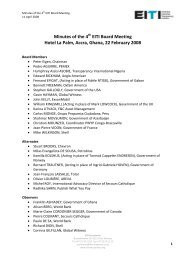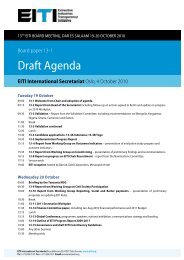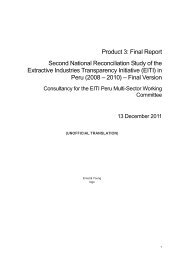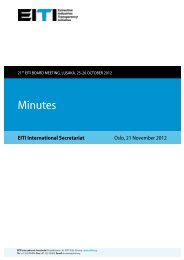CONTRACTS CONFIDENTIAL: - Good Law and Practice
CONTRACTS CONFIDENTIAL: - Good Law and Practice
CONTRACTS CONFIDENTIAL: - Good Law and Practice
Create successful ePaper yourself
Turn your PDF publications into a flip-book with our unique Google optimized e-Paper software.
12<br />
<strong>CONTRACTS</strong> <strong>CONFIDENTIAL</strong>: ENDING SECRET DEALS IN THE EXTRACTIVE INDUSTRIES<br />
Citizens will better underst<strong>and</strong> the complex nature of extractive agreements if they are out in the<br />
open <strong>and</strong> explained by the contract parties. States <strong>and</strong> companies may not be hiding anything of<br />
great import, but so long as contract disclosure is scattered <strong>and</strong> leaked materials suggest hidden<br />
horrors, that perception will persist—providing easy fodder for demagogues <strong>and</strong> politicians to make<br />
calls for expropriation <strong>and</strong> renegotiation in cases where it is not merited. Contract transparency will<br />
result in more stable <strong>and</strong> durable contracts, both because they are less subject to the population’s<br />
suspicions <strong>and</strong> because the incentives for governments <strong>and</strong> companies to negotiate better contracts<br />
will be increased. In short, contract transparency is a necessary element of any effort to promote the<br />
responsible management of natural resources for growth <strong>and</strong> economic development.<br />
Despite the many benefits that contract transparency offers, there continues to be resistance to providing<br />
systematic access to extractive industry contracts. Some of this may be due to a misunderst<strong>and</strong>ing—<br />
or a mischaracterization—of what contracts are <strong>and</strong> what they contain.<br />
Contracts are necessary to give precise detail <strong>and</strong> legal specificity to the obligations of a state <strong>and</strong> the<br />
company or consortium of companies involved in an extractive project. The details may be as simple<br />
as a few lines added to a model agreement or as complicated as a new set of laws on investment, tax<br />
<strong>and</strong> the environment. The importance of vetting the details of each agreement varies accordingly.<br />
For example, national law may dictate most of the terms of an agreement <strong>and</strong> restrict derogations,<br />
while a published “model contract” may do even more. On the other h<strong>and</strong>, a contract might—<strong>and</strong>,<br />
from what we have learned thus far, many in this sector do—establish important tax, environment<br />
<strong>and</strong> investment provisions with major implications for the state. No one would challenge the need for<br />
treaties, laws <strong>and</strong> regulations in this sector to be public; but where contracts fulfill the same function,<br />
openness is not the rule.<br />
In fact, secrecy in the extractive industries is so commonplace that until recently, neither states nor<br />
companies have felt compelled to develop sophisticated arguments to defend it. States <strong>and</strong> companies<br />
blame each other for the blanket secrecy that covers agreements; specific claims about trade secrets<br />
or commercially sensitive information are not typically supported in fact; <strong>and</strong> none of the major<br />
actors openly discusses issues of corruption, power dynamics or raw incompetence, all of which the<br />
disclosure of contracts has been known to expose.<br />
The most common arguments in support of secrecy are rooted in commercial practice, where<br />
parties to contracts routinely set the terms of disclosure within the bounds of the law. These are not<br />
negligible arguments, but they overlook the special obligations of governments <strong>and</strong> the democratic<br />
right to information. In a survey of more than 150 confidentiality clauses in oil <strong>and</strong> mining contracts<br />
worldwide conducted for this report, only one recognizes that the public interest in information<br />
should outweigh the company’s interest in confidentiality. Denmark’s Model License of 2005 for<br />
Exploration & Production of Hydrocarbons states:<br />
[Information can be disclosed if] no legitimate interest of the Licensee requires<br />
the information to be kept confidential; essential public interests outweigh<br />
Licensee’s interest in maintaining confidentiality; information of a general nature<br />
is furnished in connection with issuance of public statements […]” 2


